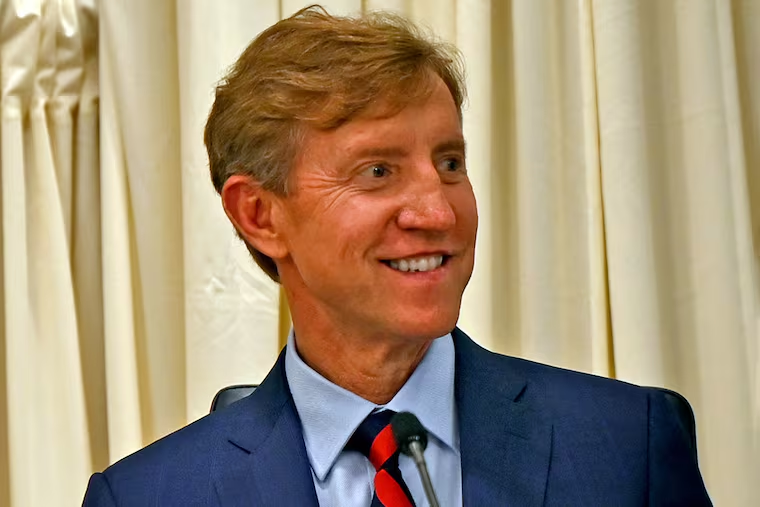With an interim president in place, what comes next for Penn?
If Penn conducts a national search, which usually takes a minimum of nine months, it’s likely Jameson would be in the role through 2024 and quite possibly even through the whole next academic year.

With longtime medical school dean J. Larry Jameson in place as the University of Pennsylvania’s interim president, the focus may soon turn to selecting a new leader for the long run.
But knowing just when that process will start remains uncertain as the Ivy League university still is reeling from the Saturday resignations of both president Liz Magill and board chair Scott L. Bok. In its announcement of Jameson on Tuesday, the university did not mention how long Jameson would serve or provide any details about a potential presidential search.
A university spokesperson declined to comment on what happens next, but observers inside and outside the university, as well as the experiences of other universities, offer some insight.
» READ MORE: J. Larry Jameson is named Penn’s interim president
First, a new board chair, then some internal work
If Penn conducts a national search, which usually takes a minimum of nine months, it’s highly likely that Jameson would be in the role through 2024 and quite possibly even through the whole next academic year. Candidates selected often must serve out the end of the term of their current job, delaying their start to the end of the academic term.
But even before that process would start, the board of trustees likely would first choose a new chair, a role that usually would figure prominently in a search because that person would eventually work closely with whoever is selected as the next president. The current interim chair, Julie Platt, has already said she will not keep the position long term because of her duties as chair of the Jewish Federations of North America.
The university has said that a recommendation for a permanent board chair is expected to be made to the board’s executive committee before the start of the spring semester in January.
» READ MORE: Penn leadership upheaval could have a ‘chilling effect’ on college presidencies and university operations nationally
That new chair would likely first focus on healing the division on the board of more than 40-members, which has been conflicted over how to handle complaints of antisemitism and the controversy following Magill’s testimony before a congressional committee last week.
Surveying the university community
Although the board could decide to relatively quickly launch a search, trustees may instead want to take the time to survey the university community on what it wants in its next president, said one search firm consultant who asked not to be identified because that person is not working with Penn.
Nearby, at Temple University — where former president Jason Wingard, who, like Magill, was on the job for less than two years and resigned amid controversy — the board of trustees waited nearly six months before launching a search. It hired the firm Collective Genius to hold in-person and virtual meetings with faculty, students and other key stakeholders on what skills and experience the next president should have. The university announced results of that process in November, and its search is continuing.
» READ MORE: Penn president Liz Magill has resigned following backlash over her testimony about antisemitism
Some universities choose to go with an internal candidate, which can quicken the process. West Chester University, a state school, in an unusual move in September made its executive vice president and provost the sole candidate to be considered by the search committee for the job, at least initially. R. Lorraine “Laurie” Bernotsky has worked at West Chester for about 27 years — though she is temporarily working at another state university with an intention to return to West Chester.
That process is complete and the university’s council of trustees recently voted to recommend that Bernotsky get the job. Her appointment ultimately is up to the Pennsylvania State System of Higher Education’s Board of Governors, which will act on the recommendation this month.
In West Chester’s case, the leadership change is not occurring following a crisis, but rather after the retirement of longtime West Chester employee Christopher Fiorentino, who plans to depart next summer after 7½ years in the job.
In Penn’s case, its statutes set a process for selection of a president, and it’s not clear whether there can be any deviation. The board chair convenes a “consultative committee” made up of trustees, deans, faculty, staff and students to assist by identifying “priorities, issues, challenges, candidate qualifications, and other factors important to the constituencies.”
The selection of a search committee, made up largely of members of the consultative committee, also is part of the process.
Could Jameson become a permanent president?
Some universities end up naming their interim presidents to the permanent post even after a search. In March, St. Joseph’s University elevated Cheryl A. McConnell, who had been serving as interim president for more than nine months and had been provost for the previous three years, to the permanent job. That’s even though the school initially said she would not be a candidate.
It’s unclear whether Jameson, 69, who had served as executive vice president for Penn’s health system and its medical school dean for more than 12 years, would even be interested, especially given that recent Penn presidents, except for Magill, have served long term.
Amy Gutmann, who is U.S. ambassador to Germany, was in the role for 18 years. Her predecessor Judith Rodin was there for 10.